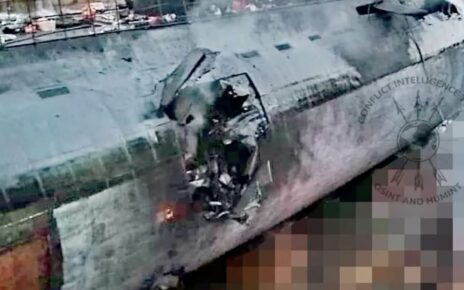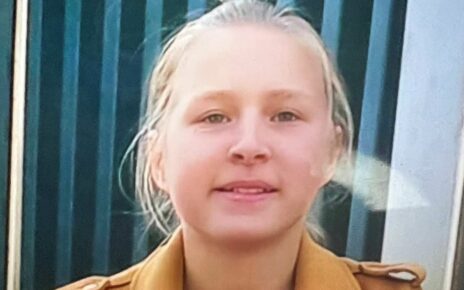NOGA TARNOPOLSKY: How the sudden realisation that Israel’s borders are made of putty in the face of Hamas aggression has left the nation stunned
Everything is quiet. Israelis are known as a loud and boisterous people — too loud, too boisterous — so the hush that has fallen over the country since Hamas launched its attack on Saturday morning feels alien and creepy.
Slowly, by and large isolated and alone, Israelis are beginning to grasp the dimensions of the disaster: more than 650 dead and counting. More than 2000 wounded, hundreds of them critical.
An unknown number of hostages dragged into the Gaza Strip by Hamas terrorists who invaded Israel, its communities, its homes and its bedrooms – captured civilians between the ages of three and 83, many of them women and girls. Terrorists who are now holding them in unknown prisons.
Yoni Asher, a resident of Tel Aviv, was one of the first to call into a radio program, midday on Saturday, and describe the indescribable. His wife, Doron, he said, had taken their two young daughters to visit his mother-in-law in a rural village in the south of the country. Now they were all gone.
I was making coffee as I heard this, and was sure I had misheard. Missing? That couldn’t happen. Not here, in Israel.
The hush that has fallen over the country since Hamas launched its attack on Saturday morning feels alien and creepy. Pictured: People surveying damage from a rocket fired from the Gaza Strip in Tel Aviv, Israel on Saturday
Slowly, by and large isolated and alone, Israelis are beginning to grasp the dimensions of the disaster: more than 650 dead and counting. More than 2000 wounded, hundreds of them critical. Pictured: A destroyed building in Tel Aviv, Israel on Sunday
Thirty-six hours after Hamas invaded and assaulted an unprepared Israel, General Daniel Hagari, spokesman for the Israel Defence Forces, announced that the army has yet to fully regain control of the nation’s territory. Pictured: A resident clears debris in a damaged building in Tel Aviv, Israel on Sunday
I left the radio on to find that streams of Israelis, helpless and distraught, were calling in crying and begging for news of relatives who have disappeared.
Late Sunday, representatives of a rapidly organised group of 900 relatives of the vanished held an improvised press conference.
One man, who introduced himself as Uri David, the father of two daughters who have vanished, took the microphone, his voice shaking. ‘We can’t believe it,’ he said. ‘It is impossible to believe. We ask our government to do something!’
Sobbing, he described the last he’d heard from his terrified girls, who were at a festival in the desert called the Nova Rave. They’d called him to beg for help. ‘We’re being shot,’ they said, as he heard voices yelling in Arabic around them.
Then, he added, ‘I heard them take these deep, deep breaths, then nothing.’
‘I am asking the entire world to look at us. We need to meet already tonight with some representative who can give us some answers.
‘No one is in touch with us: not the police, no hospital. My two daughters, I close my eyes and I don’t know where they are. Are they raping them in Gaza? Are they dumped into some ditch, half an hour from me, and I can’t do anything? Someone has to stop this.’
The sudden realisation that this fortress nation’s borders are made of putty has caused Israelis to fall into a sort of stupor. Thirty-six hours after Hamas invaded and assaulted an unprepared Israel, General Daniel Hagari, spokesman for the Israel Defence Forces, announced that the army has yet to fully regain control of the nation’s territory.
Streams of Israelis, helpless and distraught, have been calling in crying and begging for news of relatives who have disappeared. Pictured: Fire and smoke rise following an Israeli airstrike, in Gaza City on Sunday
Palestinian men walk amidst the rubble of a UNRWA school in Gaza City, which was destroyed overnight in an Israeli airstrike on Sunday
Palestinian citizens inspect damage to their homes caused by Israeli airstrikes on Sunday
There is an established protocol here for terror attacks, which are not that uncommon, albeit on a much smaller scale. In the immediate minutes after these incidents, police spokespersons appear on television screens announcing the count of the dead and the wounded. Pictured: Israeli security forces stand near a burned car at a scene where a rocket fired from Gaza strip hit a building on Saturday
This is not the Israel we Israelis thought we knew. And if that weren’t bad enough, we can barely recognise our own government which seems to have gone missing. Pictured: People take refuge in a shelter in Tel Aviv on Saturday night as sirens heard as the Hamas had begun a massive shooting of rockets from the Gaza Strip into Israeli territory
Thirty-six hours after the invasion began, terrorists are still roaming free in several southern Israeli towns and villages, while residents are enduring the end of their second full day in bomb shelters.
READ MORE: Horror as at least 260 bodies are found by rescuers at Israel festival site where revellers ran for their lives
As I write this, I hear a military warning on the radio for residents of Zikim in the south to lock themselves in shelters, because of yet another possible invasion by a terrorist cell.
This is not the Israel we Israelis thought we knew. And if that weren’t bad enough, we can barely recognise our own government which seems to have gone missing.
There is an established protocol here for terror attacks, which are not that uncommon, albeit on a much smaller scale. In the immediate minutes after these incidents, police spokespersons appear on television screens announcing the count of the dead and the wounded.
Not this time. No one seems to be in charge. Prime Minister Netanyahu has yet to address his people live on camera. Israeli media are calculating the rising number of the dead by collecting the figures released, one by one, by all the hospitals in the country, individually.
As I write, Ron Dermer, the minister of strategic affairs and Netanyahu’s closest aide, admits, on camera that ‘we don’t know how many hostages there are because we don’t know how many dead there are.’
It is impossible not to wonder whether the government haven’t been releasing the number of the dead and disappeared because it has fallen into chaos or – as the parents of vanished children claim – they aren’t doing so because they refuse to admit the true cost of their terrible intelligence and security failure over this attack.
Nothing feels like it did before. Jerusalem, like Tel Aviv, is a ghost town. Schools nationwide have been ordered closed by the Home Front Command but there are no kids playing on the streets.
While no missile has actually landed in the capital city, the parks are empty, cafés and restaurants are shuttered. In my usually animated Jerusalem neighbourhood, the only sounds I hear are fighter jets in the air, and, every few hours, the sound of the muezzin calling people to prayer.
Nothing feels like it did before. Jerusalem, like Tel Aviv, is a ghost town. Schools nationwide have been ordered closed by the Home Front Command but there are no kids playing on the streets. Pictured: Israelis inspect the rubble of a building a day after it was hit by a rocket fired from the Gaza Strip, in Tel Aviv, Israel on Sunday
While no missile has actually landed in the capital city, the parks are empty, cafés and restaurants are shuttered. In my usually animated Jerusalem neighbourhood, the only sounds I hear are fighter jets in the air, and, every few hours, the sound of the muezzin calling people to prayer. Pictured: Police at the site of a destroyed building in Tel Aviv, Israel on Sunday
It feels post-apocalyptic. In my area, one of the few mixed Jewish-Arab neighbourhoods in town, the residents’ WhatsApp group, normally filled with traffic complaints or requests for apartments to let, has become the repository of urgently needed information. Where are the bomb shelters? Where can one give blood? Where can one donate to IDF soldiers in need? Pictured: People walk by the damage from a rocket fired from the Gaza Strip in Tel Aviv, Israel on Saturday
Worse, posts appear with instructions for family members of the disappeared, offering advice and information about where they should take belongings which can provide samples of their loved ones’ DNA. Pictured: Israeli security forces gather in front of a building in Tel Aviv, after it was hit by a rocket fired by Palestinian militants from the Gaza Strip on Saturday
It feels post-apocalyptic. In my area, one of the few mixed Jewish-Arab neighbourhoods in town, the residents’ WhatsApp group, normally filled with traffic complaints or requests for apartments to let, has become the repository of urgently needed information. Where are the bomb shelters? Where can one give blood? Where can one donate to IDF soldiers in need?
Worse, posts appear with instructions for family members of the disappeared, offering advice and information about where they should take belongings which can provide samples of their loved ones’ DNA.
READ MORE: Iran ‘helped plan Hamas attack on Israel and gave green light for the assault at a meeting in Beirut last week’: Islamic Republic ‘devised assault’ that plunged the Middle East into war
Everyone is calling the radio shows, and the usual news radio programmes have turned into anguished vehicles of heartbreak. In the cloud of war, in the absence of government information, citizens call in desperately and the feeling is that the sky has fallen in.
Reshet Bet, the national broadcaster, has been transformed into a national therapy centre, with a psychologist constantly on air. One mother, her voice breaking, said that her 24-year-old son, an army officer, had not responded to her or to his commanders in 30 hours.
‘You’re a good mother,’ the psychologist replied, ‘looking for her son. You are doing what you need to do.’
‘No one from the army has called me! No one! I need help!’ the mother wailed. ‘How is it possible that I haven’t heard from anyone?’
Israel has so far established two official hotlines: one for those searching missing civilians, the other for missing service members. But families are still desperate for information.
It would be a mistake to assume that the attack is being felt principally in the south of the country that borders on the Gaza Strip. The agony is felt across Israel.
Again, in my neighbourhood, the parents of Ophir Engel posted pictures of their son, who had travelled south to visit his girlfriend. This was a long holiday weekend in Israel, with the festival of Simchat Torah taking place on Saturday. Many Israelis had innocently hit the road.
Smoke rises after Israeli airstrikes in Gaza City, Gaza on Sunday
Israeli police check the damage from a rocket fired from the Gaza Strip in Tel Aviv on Saturday
‘Our beloved son and grandson was kidnapped yesterday from the bomb shelter when he went to visit his girlfriend in Kibbutz Beeri,’ they wrote. ‘We would be grateful for any information.’
The initial images of Hamas terrorists gleefully taking selfies next to abandoned Israeli tanks appeared to have been taken from a dystopian b-movie, but then pictures of bloodied young girls being pulled by their hair into Hamas captivity emerged and the reality of the horror was there for all to see.
At the press conference held by families of the disappeared, one parent after another related their private nightmares.
Omer Bar Shem-Tov’s parents described seeing him, alive, wounded, handcuffed, laying on the ground, in one of the propaganda videos released by Hamas. ‘We need someone to call,’ his father begged. ‘It’s impossible that we haven’t heard from anyone. We need answers. We need transparency. Something!’
Source: Read Full Article


















